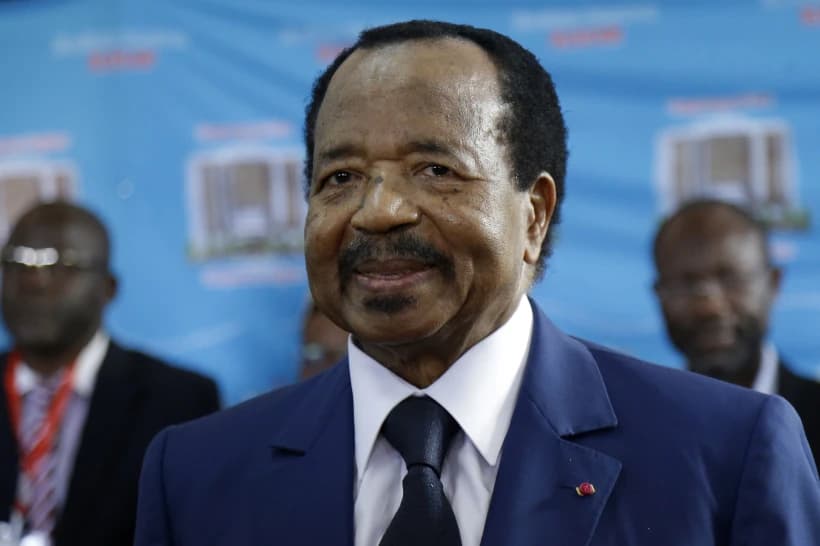YAOUNDÉ, Cameroon – Echoing earlier calls for change by some Cameroonian bishops, a Catholic priest has invoked the Holy Spirit, urging it to bring confusion akin to the biblical “Babel” on the country’s ruling elite.
Father Richard Alphonse Sandjong Yakam, of St. John Paul II Parish in Banengo, in the West Region, used his Pentecost Sunday homily to emphasize that change had become imperative for Cameroon.
He drew a parallel, stating that just as God commissioned the Holy Spirit to sow confusion among those who sought to rival Him by constructing the Tower of Babel, Cameroonians now need to invoke that same Spirit to disrupt the ruling elite whom he accused of state capture.
“The Holy Spirit had confused the language of those who had built the Tower of Babel to compete with God. God sent the Holy Spirit to confuse them, and the Holy Spirit descended and sowed confusion in their language; and they dispersed. We are also praying that this very Spirit should come to our country and sow confusion in the language of those who have taken the country hostage and free this country so that everyone will find their footing, so that every of God’s children should find freedom, peace and wellbeing; so that Cameroon that God placed under the patronage of the Virgin Mary becomes a country in which life is worth living,” the priest said.
He called on the Holy Spirit to make Cameroonians understand that they are capable of overcoming domination.
“May Cameroonians overcome fear. May the Holy Spirit liberate Cameroonians to defeat fear and act like the Apostles, who, after receiving the Holy Spirit, left their hiding places and boldly spoke the truth,” Yakam said.
“The Holy Spirit needs to renew and transform everything. Cameroon needs a new start. Conquering fear means recognizing that we are free children of God. The most important good He has given us is freedom. However, this freedom should not be confused with profligacy or licentiousness,” he said.
“True freedom means living as directed by the Holy Spirit, and He can only lead us in God’s direction. Those who allow themselves to be led by the Holy Spirit are not controlled by their base instincts or desires (the ‘flesh’). Their focus shifts from worldly things to heaven. It is the Spirit who frees us from all burdens—the yoke of slavery, tribalism, nepotism, lies, and embezzlement,” the priest added.
The message from the priest comes just months before the next presidential election. Incumbent President Paul Biya, aged 92, is widely expected to seek re-election after 43 years in power.
Yakam’s remarks add to the voices of Catholic clerics increasingly vocal about the need for a fresh face in the Cameroon Presidency.
While the Catholic Bishops’ Conference in Cameroon has not explicitly called on the President to step aside, they have made statements criticising his government for failing to deliver the goods of governance.
On March 28, they issued a pastoral letter defining the qualities required of a president: “Integrity, humility, modesty, and moral leadership qualities.”
The letter stated that the future president must not use his power to “enrich himself” and “must be able to travel throughout the country, visiting each region at least once during his term.” In this way, he will be able to “understand the needs and desires of the Cameroonian people.”
The bishops didn’t mention President Biya, but the condition of travelling the country is something the President can’t clearly do: He isn’t known to have visited many regions in his 43 years in power, and in recent years, is known to have been spending more of his time in his native village, Mvomeka.
Individual bishops in Cameroon have however directly called on Biya not to seek re-election.
Archbishop Samuel Kleda of Douala had said that urging the president to seek re-election was “unrealistic.”
Bishop Barthelemy Yaouda Hourgo of the Catholic Diocese of Yagoua spoke about the frustrations facing Cameroonians and noted that even the devil couldn’t inflict greater pain on the people.
Bishop Emmanuel Abbo of the Catholic Diocese of Ngaoundere expressed dismay at the government’s stifling of dissent, particularly accusing the country’s interior minister of using language that suggests any opposition to President Biya could be dealt with in very violent fashion.
Archbishop Jean Mbarga of Yaoundé was more circumspect, urging the faithful to “assume their responsibilities towards the nation.”
The election will take place in October this year, and although the elections management body ELECAM hasn’t validated any candidatures as yet, a number of Cameroonians have signaled their intentions to run, including Prof. Maurice Kamto of the MRC party, Cabral Libi of the PCRN, and Barrister Akere Muna, who has been endorsed by Univers political party.
President Paul Biya hasn’t declared his candidacy yet, but his supporters have been urging him to seek an eighth term in office.















